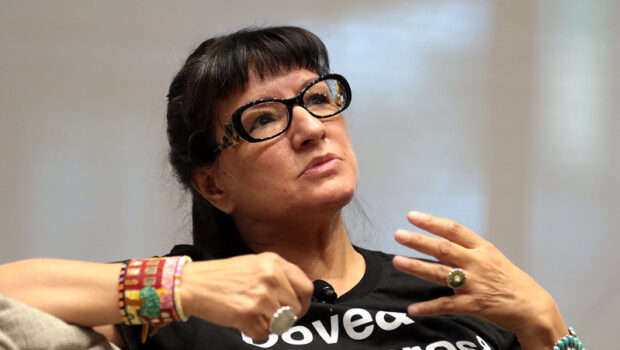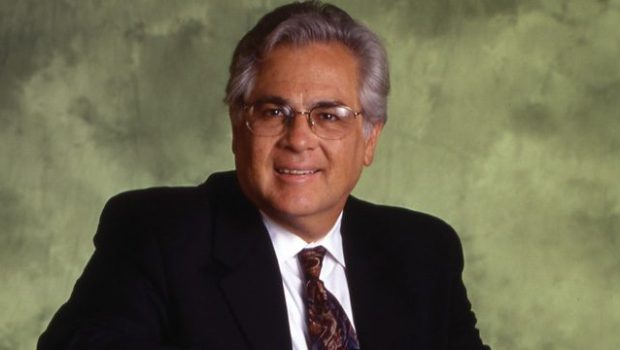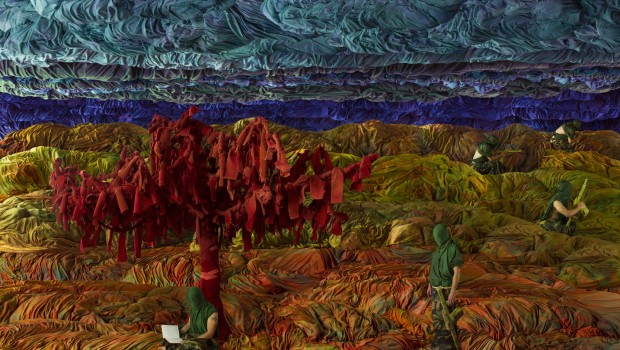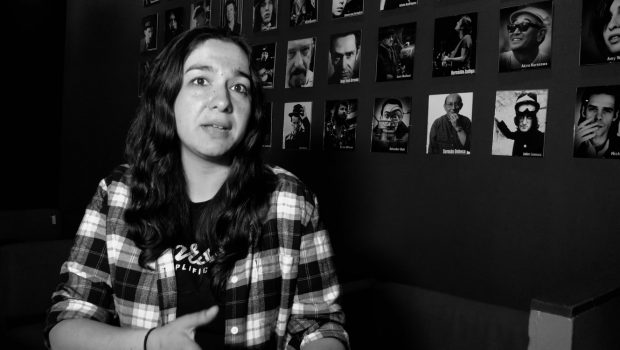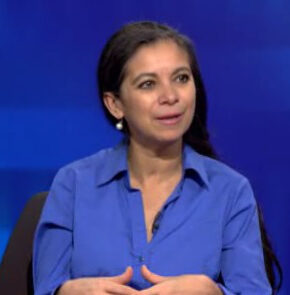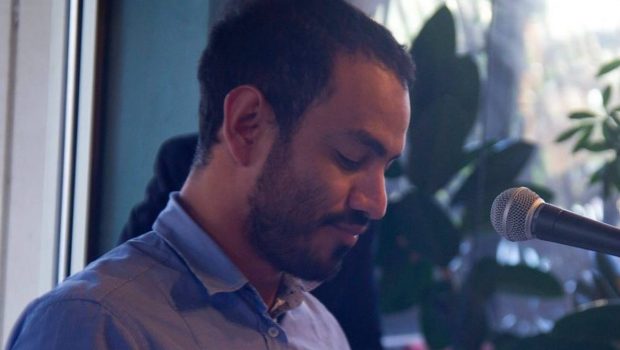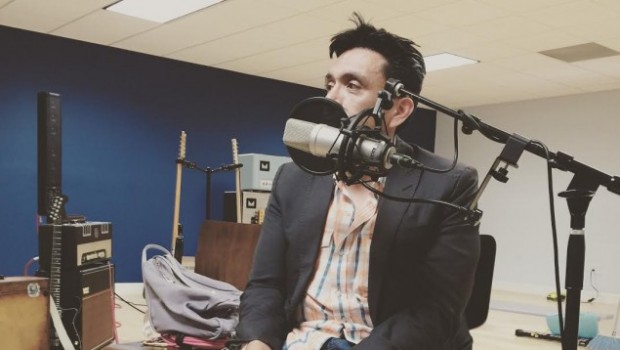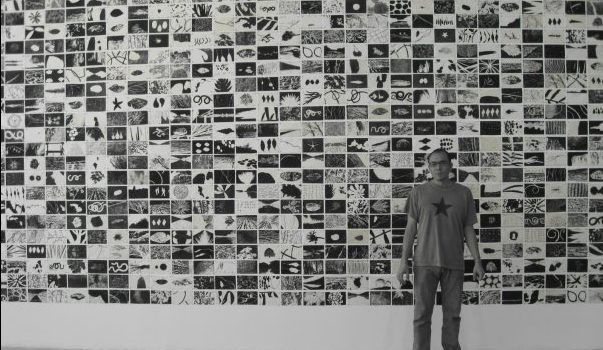Las girlfriends on the Caramelo book tour of Spain
Liliana Valenzuela
La Sandra asked me to come on this trip to Spain with her, as she was feeling a tad nervous about giving interviews and readings in the Spanish of Cervantes. I was to be her security blanket, her interpreter of sorts, and I was more than willing to help, but I also knew that I was just Dumbo’s feather, and that she would do just fine without me. Still, I was grateful to be sharing a room with her. It felt like a big celebration. And with a glass of Moscatel wine in hand, looking at Las Ramblas from the window of the Avenue Hotel in Barcelona, I was elated to be there to share in her success, which, because of my translation of her novel, Caramelo, was also mine.
We’ve had a great working relationship based on respect and mutual admiration. And a wonderful friendship of eighteen years and counting. Still, when you travel together, you really get to know someone. So, after the initial trepidation and excitement, I relax into it. She’s generous to a fault, solicitous about my comfort, making sure I have eaten, slept well, gotten what I needed. She’s a big shopper who ends up giving most things away as gifts, to friends and to anyone who comes in contact with her, such as our gracious Spanish hosts. I also enjoy watching her creativity at work, like when she pays close attention to the graffiti on the walls—Pan con tomate, Papeles para todos, Léeme, cuando se te olvide que te quiero—and I’m almost able to see the little wheels turning, and her mind turning those phrases and images into a poem, an embroidered pillow, a story.
Sunday morning, as we step off the taxi at the Cathedral, a couple of gitanas press Rosemary sprigs on our palms, offering to predict our fertility for a few coins. We quickly escape through the back streets.
Bar Restaurant Las Escobas, est. 1386, Seville, May 18, 2003. In a flamingo colored room, small lion faces lurk embossed in dark wood ceilings, an ancient wooden bar holds even more ancient dark red wines, little angels above our table, todos menos nosotras, watch over us, like the divine Providence. I look at Sandra in her gold hoops and crocheted black beret as she savors a plate of cold gazpacho soup garnished with egg crumbs, croutons, cucumbers, and pimentos, a glass of zumo con tinto in her hand. Animated chatter in Spanish, plates clinking, carcajadas, entire families out for the Sunday comida. ¿Me pasas un bolillo? Sandra and I communicate in a mix of English and Spanish that comes naturally to us living on the Texas border, and being both Mexican and American.
* * *
LILIANA VALENZUELA: Would you say la Divina Providencia has brought you all the way here to Spain and life in general?
SANDRA CISNEROS: When I was younger I didn’t have a sense of there being any patterns in my life, or any design, except for occasional moments, as when I was hit by that car when I was 21. That was the first time I knew there was something bigger, taking me along, dragging me along. Desde entonces, especialmente después de mis momentos de crisis, como cuando casi me suicidé a los 33, o a los 21 cuando me llevó ese coche en la carretera, I knew there was a plan for me. So many accidents, I almost feel a wonderful pleasure in being this little barquito that‘s being taken along, and brought back here to the barrio of my abuelos. It’s really nice. I don’t feel the kind of pressure I used to feel about getting things done, because la corriente siempre me lleva where I’m supposed to go.
L. V.: Why did you want to come to Seville after your book tour?
S. C.: Well, I always write to find answers about myself, and this place is part of that. Un hilito that connects me to the old from the new, because I know that the person who came from the Old World to the New World was mi abuelo sevillano. I don’t know about his wife, whether she was, as they claim, española, or whether he married someone in Mexico. So much of what is said is an exaggeration, it might have been said to advance the Cisneros’s claim that she was española too. But she doesn’t look like one when I see her photo that I have in my bedroom, se ve que tenía una nariz un poco squashed, could be an indígena or a gitana, but I don’t know how he could’ve married someone like that, he was un hombre blanco. So I’ve always had this idea in my head that he married someone in Mexico. My father’s cousin gave me my great grandfather’s baptism records from the Iglesia de San Esteban in Seville.
L. V.: Are you feeling more curiosity about the Spanish side of your heritage at the moment, or you just happen to be here for a book tour?
S. C.: I have this suspicion about the motley ethnicity in my family, thus, I’m really convinced that we are Arab Jews. That’s what I want to confirm.
The sights and sounds of a lazy Sunday afternoon in the barrio of Triana. El sonido de las palmas behind a metal corrugated door, where a family plays authentic flamenco, while outside, the sounds of buses, and motorcycles are the only signs of life in the otherwise quiet modorra del domingo. We’re in search of el duende García Lorca spoke about, the creative spirit-energy that summons you to the edge of the cliff and dares you to risk it all, and give the performance of your life, each and every time. Zapateo, palmas, cajón, niña peeking from underneath the door. Buscando el duende…
L. V.: Do you also feel the flamenco influence in your soul, in your roots?
S. C.: Bueno, a mí me gusta, but I would hate to brag that I’m gitana too. I wish I could say that, but I feel a little bit self-conscious, just like people who claim to be Native Americans… (laughs), there’s something about it that makes me hesitate to claim that.
L. V.: What’s strongest in you right now, your Spanish heritage or your indigenous heritage, or is it just a mezcla, a mestizaje?
S. C.: I’m not thinking about the Spanish part right now, I really think of the árabe and maybe the judío, especially the Arabs, maybe because of everything that’s going on in the world right now.
L. V.: So what comes after Caramelo?
S. C.: The fields have to lie fallow.
L. V.:What kind of answer is that?
S. C.: I haven’t had time to write since Caramelo, because I’ve been promoting Caramelo!
In the past, she used to give me the impression that she wasn’t listening, too busy with her own preoccupations. But then she’d surprise me by remembering a story I had told her word for word, like when I described to her the birth of one of my children. I’ve also seen her change from being a single-minded, ambitious young woman with her own agenda, to a more mellow and centered woman in the prime of her life.
L. V.: You seem to have been extremely motivated early on in your career. While others were dabbling with this or that, you were very focused and single-minded about your writing.
S. C.: Yes, I was, but I didn’t know why I was doing it, I didn’t understand my purpose. That’s become clearer and clearer to me with every year, so that when I turned forty I really asked for spiritual wisdom, and, boy, I sure got it! And now, ten years later, I feel like I’m supposed to be doing something with everything that I’ve gotten. I feel this intense hunger to learn in order to do the work I’m doing.
L. V.: You’ve been so good on this book tour, you eat well, don’t drink or smoke. Is that how you keep your stamina, your energy level?
S. C.: When I began to tour I had a real poverty mentality. Just because someone was paying for it, I would eat the most expensive things, even though it was late at night, because my publisher was paying for it (laughs). I was used to being poor. I would order a steak or something, and now I don’t have do that, I can eat whatever I want. I try to keep myself well fed, with enough time to digest, not only food, but also solitude, so when I’m driving with somebody, I close my eyes, I tell them I need to meditate, just some time to shut down and regain my energy. I take my job very seriously, I do a really good job. I don’t go out partying and get all drunk, I don’t do that.
L. V.: Have you had your moments of grace, when you feel like you’re doing the right thing?
S. C.: Yes, I feel it a lot when teaching, in my workshops, and when I’m speaking, cuando comparto algo con el público that’s coming from my heart, or when I get their testimonios afterwards. They say, “Oh, you read something that I really needed to hear.” When I get those kinds of confirmations, I feel the light, like I’m doing the work I’m supposed to do.
L. V.: So do you feel you’ve accomplished a “Reconquista de España” of sorts?
S. C.: Yes, it’s been very good personally. I don’t know that I have done this for anybody’s causa or anyone else. When a Chicano writer does a very bad job, es una desgracia para todos, because everyone will look at all Chicano writing, and maybe not even pick another book by a Chicano writer, and dismiss us all. When one person does something good, then it’s a great feat for everyone, and we all benefit, all of us. That’s how I feel.
L. V.: We may be on the verge of a new acceptance of Latino writing here in Spain and in Mexico, it feels like the door is cracked open…
S. C.: Yeah, I believe so. I think we have some really good writers like John Phillip Santos, who can carry their own in any language. Luis Rodríguez’s poetry, Denise Chávez’s latest work, Ruben Martínez’s work, Francisco Alarcón’s poetry, we’re building up a stronger generation of writers. Más fuerte. I know that. I really like some of the Chicano writing that’s coming up even better than what we saw twenty years ago. I don’t consider myself an expert on Chicano writing, I’ve read some of the old guys, and no me gusta. And there are some of the women writers that I don’t like either. I know who I like, y ya.
Sandra says just what’s on her mind, and she often cracks me up with her ocurrencias, her wit and her sense of humor.
L. V.: I have noticed you have adopted the Spanish lilt while you’ve been here. It’s adorable.
S. C.: Yes, that’s because I’m like a little parrot, my father’s nickname was “el perico,” or “el periquín” sometimes. And I’m like him too.
L. V.: Would you say that you have a musical ear?
S. C.: Yes, I do, I can hear things really well. I also have a strong visual memory, I can look at something and think, now, why does this look funny? I don’t have a good memory of people’s names or whether I’ve met them before, especially if they don’t make an impression. But the people who fascinate me because of their clothes, or their eyes, things that catch my eye or my ear, my sense of smell, those kinds of impressions stay with me. In my family we never had the opportunity to have singing or dance lessons, but the nun at school sounded like she was giving birth when she sang.
That evening at the Alfonso XIII Hotel in Seville, done in elaborate Mudejar style, enter two tired bag-ladies suddenly transformed into señoras decentes y elegantes by virtue of a makeup touch-up, a sprinkle of water, and a brush. They stroll into the regal bar of the Alfonso XIII where a pianist sitting at a grand piano envelops them in the waves of Adios Mariquita Linda, El Danubio Azul, Malagueña, Granada de Agustín Lara, and classics by Falla and Granados. We sit down, order tinto con zumo, and munch on roasted almonds and olives, and continue our never-ending conversation. She claims that she was shy and quiet as a child. Now she more than makes up for it, being articulate, outspoken, and a natural comedian. Sometimes my sides hurt from laughing so much.
L. V.: A ver, Sandra, I’m intrigued about your concept of “Rascuache” and “High-Low.” You’re such a fashionista, have such a good eye for things, yet you come up with such unique combinations.
S. C.: Pues el rascuache is when you make do with found objects, you make things up; but high-low is when, for instance, you drink Veuve- Clicquot champagne paired with a Maria Callender pot pie (laughs)…that’s what I had for dinner the other night, “muy rascuach.” Another rascuache thing, my boyfriend Ray says, is when I go to these real fancy hotels and take the soaps and shampoos daily, so I get them replaced, and bring them home. He says I’m being “rascuach.” Then I put them in my guestroom, or take them to Cuba as gifts.
L. V.: What would be high-low in your dress?
S. C.: High-low is shopping at Target for this piece of clothing, and mixing it up with Yves Saint Laurent or Manolo Blahnik. That’s very High-Low.
L. V.: And what in your background prepared you for that…?
S. C.: My mother… went to thrift stores, but would buy fine British china. My father also trained me because he had this fine experience of telas. He would bring fabrics home, scraps of these really exquisite materials for me to play with and make pillows or doll dresses with. Nice little brocades, and tapestry, really expensive fabrics meant for fine antiques, so I got used to quality things.
I felt closer to her toward the end of our trip, no longer star-struck traveling with a celebrity, just two friends having fun, discovering Seville together. But perhaps most memorable were our daily extensive fashion consultations, although sometimes Sandra would try on her entire wardrobe for me, all possible permutations of shoes, clothes, and accessories such as earrings, rebozos, sombreritos, etc., making choosing an outfit, a truly dizzying experience. Yet, it all boils down to a savvy woman’s primordial question: ¿Qué me pongo? What shall I wear?
Lo bueno es que aquí en España te puedes vestir así y no piensan mal de ti (referring to her Aztec pirate look, or the Charro “Mano” look, a real rosary tied to her waist, and dangling between her legs), but if you dress like this in the United States, they think sexy women have no brains.
L. V.: No saben que sexy es power
S. C.: Sí, it’s power for Latinas (laughter). We like cleavage. ¿Y por qué no? We like piropos, especially when you’re older. Como el señor que se paró y me dijo: “Hola, mujer bonita.” Me quedé un poco lela, because I wasn’t expecting it. And I have all these power bras. Fui a Las Vegas y todo el mundo llevaba cleavage, an astonishing cleavage, así se visten en Las Vegas, it was like in Dangerous Liasons. I was like, wow, I got my nails done, pero, I thought, man, I need to go buy a bra! Y me compré este, está lindo, this turquoise bra is my favorite, ¿me pongo este o el negro? Además it makes you feel bonita, eso es lo importante, it’s all psychological, ¿no es cierto?
Sandra la juguetona who is still fascinated by toys and buys toys wherever she travels, like the little osito she bought in Holland and who kept us company in each hotel. She made the osito speak like Señor Wences, the Spanish ventriloquist, making up funny stories about living on the Calle Jesús de las Tres Caídas, by the Plaza de la Alfalfa. Sandra la payasa who tells me stories and makes me laugh, Sandra my friend, comadre, and mentor who has always helped me, in ways big and small. Sandra, the tireless peregrina who has found her duende. Sandra la Chicana de corazón de oro.
From there we went on to New York City to inaugurate the auditorium at the Instituto Cervantes. But that’s another story.
*Imagen de Gage Skidmore (All Creative Commons)
Posted: April 1, 2012 at 9:27 pm


